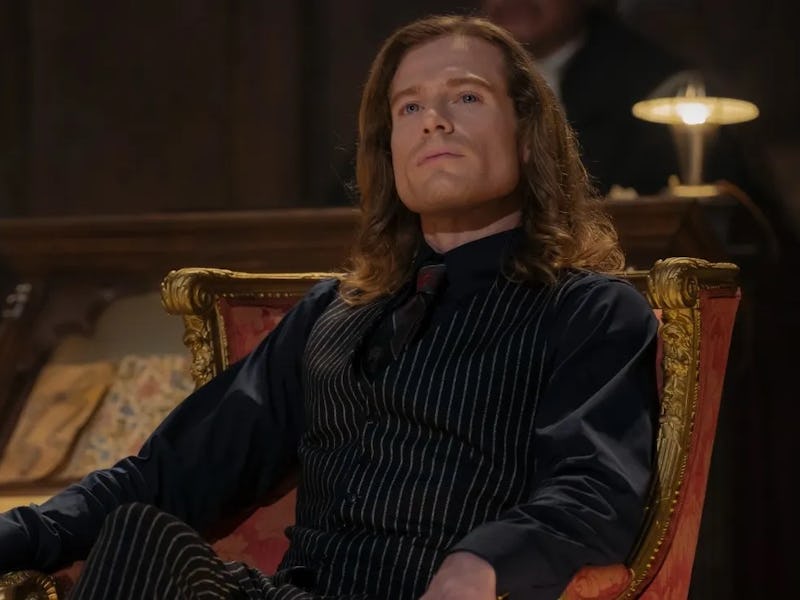Interview With the Vampire Just Aired the Best Season Finale of 2024
No show on TV is doing what it’s doing right now.

Interview with the Vampire’s tagline, “Let the tale seduce you,” is an almost comically direct statement to the audience. Rife with outsized emotions and monstrous morals, the show envelops us in a world of romantic horror. At the same time, that slogan has an obvious double meaning. Explicitly told by unreliable narrators, parts of this tale seduce us under false pretenses — and we’re happy to go along for the ride.
Remixing the novel by Anne Rice, AMC’s Interview with the Vampire follows journalist Daniel Molloy (Eric Bogosian) as he interviews the 145-year-old vampire Louis (Jacob Anderson) about his life, fact-checking Louis’ conflicted memories. Initially a framing device for historical flashbacks, these conversations develop into an intense psychodrama as they relitigate the truth of Louis’ past.
It’s easy to praise Interview with the Vampire for its sophisticated writing, Succession-level performances and accomplished grasp of gothic romance. But beyond that, it’s an underappreciated showcase for old-school episodic storytelling.
In an era of poorly paced “six-hour movie” miniseries, IWTV is designed to work as a weekly serial. We need time to digest between episodes, in part because vampiric emotions operate on such a grand scale. The season 2 finale builds on decades of backstory, culminating in a uniquely moving scene that just wouldn’t work between human characters — or hit quite as hard if we’d just marathoned a whole season in one go.
Warning! Spoilers for Interview with the Vampire’s Season 2 finale follow.
All is revealed in the Season 2 finale.
After two seasons of buildup, last week’s penultimate episode revisited Louis’ defining trauma: the death of his daughter Claudia (Delainey Hayles), executed in the 1940s following a sadistic show trial.
Louis has long believed that his ex-lover Lestat (Sam Reid) betrayed him and Claudia by acting as the trial’s star witness — a betrayal that launched Louis’ current relationship with the vampire Armand (Assad Zaman), who seemingly rescued him from suffering Claudia’s fate. But now we learn the truth. Armand actually orchestrated the trial himself, and Lestat was the one to save Louis.
Foreshadowed for several episodes, this twist hits the finale like a meteor strike. However we can’t simplify the episode’s impact to a single revelation. Drawing to the end of Louis’ flashbacks, the overlap between past and present becomes more potent, rising to a fever pitch as he confronts his grief. Beneath everything is a tormented belief that he caused Claudia’s death by falling in love with Lestat, precipitating a sequence of inevitable tragedies.
Backed by an electrifying jazz score, one of the episode’s most powerful scenes sees Louis slaughter his way through Claudia’s killers — a thrilling sequence that he’s clearly mythologized within his own memories. Yet it’s intentionally undermined by our knowledge of the future. Louis will spend the next 80 years in a depressive holding pattern, until Daniel unravels Armand’s deception in the present day. Only then can Louis move on to the next stage of grief, tracking down Lestat for an achingly poignant reunion.
One fascinating artifact of IWTV’s framing device is that up until this moment, we haven’t met the “real” Lestat. The interview depicts him from Louis and Armand’s biased perspectives, highlighting his charisma and volatility as a lover. During the reunion he’s a more vulnerable figure; an unglamorous reintroduction that cements his power as a romantic lead. Fueled by Reid and Anderson’s overwhelming chemistry, the sheer emotion on display is captivating. We understand that Lestat’s love runs equally deep — and that after all the violence and recriminations, he and Louis can finally stand on equal footing.
Louis deals with his trauma in the finale.
Concluding a two-season arc, this scene neatly segues into a deliciously unexpected epilogue. A couple of years later, Daniel is now a vampire himself, turned (offscreen!) by Armand. His interview is a bestselling book, and since the wider vampiric community is obsessively secretive, that book has earned Louis a ton of enemies. Newly independent and secure, Louis ends the episode with a provocative declaration to the rest of vampire-kind: “I own the night.”
I could write thousands of words about how well this episode sticks the landing, but on a structural level, the explanation is deceptively simple: TV finales are a very specific form of storytelling, and IWTV’s writers hit every single mark.
After the nauseating rollercoaster drop of Claudia’s death, the finale must lead us through Louis’ journey of grief, rage and revelation, culminating in the catharsis of reuniting with Lestat. Then — somehow without undercutting what came before — we get an ambitiously fun teaser for future storylines. All the big emotional arcs are wrapped up in a satisfying manner. All the loose ends will clearly be tackled next season. We’re left with both a sense of closure, and with the reassuring certainty that IWTV’s creators know what they’re doing. That's a vanishingly rare feat in the streaming era, especially when combined with the promise of a cleverly plotted season 3.